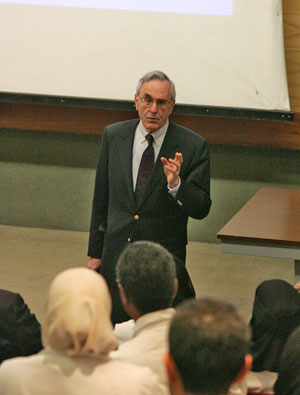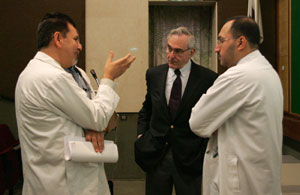Return Visit to Qatar by Chairman of Medicine at WCMC-NY

Dr. Ralph L. Nachman
After holding a series of meetings in Doha in April, Ralph L. Nachman, M.D., E. Hugh Luckey Distinguished Professor of Medicine and chairman of the department of medicine at Weill Cornell Medical College in New York, and physician–in–chief at NewYork-Presbyterian Hospital, said: "The opportunities to do something meaningful in dealing with major biomedical diseases are ones that this community (in Qatar) and this Medical School can add a lot to."
Dr. Nachman was making a return visit to Doha for the first time since 2001. On that occasion, he was part of a team from Weill Cornell in New York that came to explore the situation on the ground following the signing of the agreement with the Qatar Foundation to establish a branch of the Medical College in Qatar.
Looking back, he said: "We were looking at the whole picture of what a medical school would bring to the area, not only in terms of its impact on the local population with respect to health care, but to the educational and scientific processes."
"I think everybody came away with the idea that this was the beginning of something important and exciting. Now, here it is 4 years later, and it’s invigorating to see what has happened."
Of the WCMC-Q building, he said: "I never envisioned anything as dramatic. It is an extraordinary expression of creative architecture and function." He commented favorably on its spaciousness and sophisticated technology, and on the ovoid lecture halls that are modelled on the Weill Auditorium at WCMC-NY.
Dr. Nachman also remarked on the rapid growth of Education City, and of Qatar’s capital city as a whole.
During the visit, he met with leaders at Hamad Medical Corporation (HMC) and the Qatar Foundation, as well as with Kenneth Bloem, interim CEO of the Specialty Teaching Hospital, which is set to open in Education City in 2009.

During his visit to Doha, Dr. Nachman presented
Grand Rounds on Hypercoagulable states at
HMC, and discussed some of the issues raised in his
lecture with physicians at the Hamad Hospital.
HMC is partnering WCMC-Q as a site for the clinical education of medical students, and Dr. Nachman noted the commitment of the Corporation to meeting the requirements of the Joint Commission International (JCI.) Part of JCAHO (the U.S.-based Joint Commission on Accreditation of Healthcare Organizations), this is the body that oversees the accreditation of hospitals outside the U.S. "From what I can see, the leadership is deeply committed to seeing that they meet all of the criteria of a modern, front rank institution. This is an excellent development," he said.
The process is very broad–based. "(It covers) everything from the capability of taking care of patients and providing educational opportunities to, above all, maintaining the highest quality, along with a real sense of recognition of the fact that an institution can’t stand still, but has to move forward into the future. Also, you have to be accountable for the quality of what you do, and meet certain bench marks of performance."
With the clinical clerkships for WCMC–Q’s medical students due to begin in 2006, JCI accreditation will mean that they receive clinical education on a par with that offered to medical students at Weill Cornell in New York. "Our students should be exposed to the best in the way of medical practice, and to the best in the way of medical practitioners," said Dr. Nachman.
He also noted the significant expansion of HMC facilities: "I'm most impressed by the amount of building going on, and particularly by the new Al-Amal Oncology Hospital. It's a truly magnificent facility with spacious halls, wonderful patient rooms and a lot of areas for laboratory, as well as clinical, activities."
Asked about the future role of the Specialty Teaching Hospital (STH) and the Research Program to be carried out by Weill Cornell, Dr. Nachman explained that the proposed large-scale genomic study of the population in Qatar would lead to an understanding of some of the basic disease processes that affect the population.
Combining these findings with activity at the STH could result in better diagnosis and treatment of the conditions, he said. "The two aspects will synergize nicely: the STH, with a major dedicated clinical research enterprise, would be a natural fit to the basic scientific genomic analysis of the population."
During his visit, Dr. Nachman, whose entire career has been at Weill Cornell Medical College in New York, presented Grand Rounds at HMC on an area that has been a focus of his research: blood vessel disorders. Examining the problem of hypercoagulable states, in which the collection of thrombin within a blood vessel may pose a serious health risk, he focussed on the endothelium, or lining of the vessel wall, as the site of crucial activity in the regulation of blood flow.
Dr. Nachman gave a detailed picture of the factors implicated in the disorders, and looked at the patient groups that are most at risk. He urged particular caution in the care of pregnant women whose family history, or experience of recurrent complications during pregnancy, might point to an underlying thrombophilic condition.
